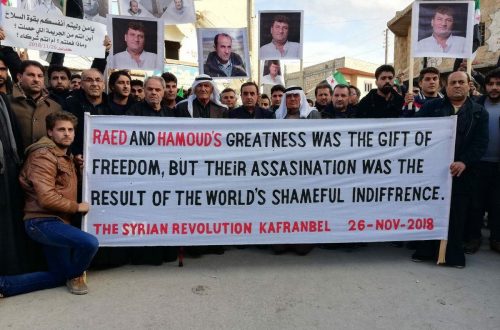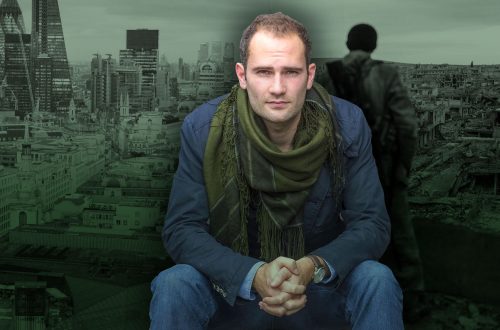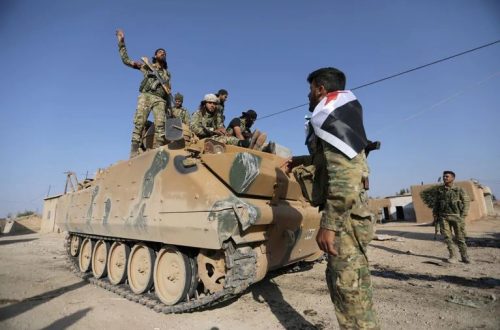Guest post by DaveM
Just a day after gunmen attacked the offices of the pro-Assad news TV channel Al Ikhbariya, two car bombs exploded outside the Law Courts in central Damascus, by the citadel and the famous Al-Hamidiyah market at the entrance to the old city.
Syria State TV was first to broadcast footage of the aftermath of the blast:
“Two terrorist explosions in the car park of the Law Courts in the Merja area of Damascus. Another bomb didn’t explode even though Al Arabiya reported that 3 bombs exploded. These are the first pictures of the terrorist explosion which took place in the car park of the Law Courts in the Merja area of Damacus where …. There were two explosions in the Law Courts car park and another bomb didn’t explode. These first pictures show the size of this explosion, and we can see the fire service attempting to put out the blaze which resulted from these two explosions.”
SANA, the government news agency, also published pictures of the aftermath of the explosions.
It’s clear that the opposition have penetrated Damascus and are now striking at the regime’s symbols. The Syrian UN envoy claimed that Syria is facing a terrorist conspiracy and that Al Qaeda are involved in the attacks and Ban Ki Moon believed that the two suicide car bombs which killed 55 people in May was an Al Qaeda act.
How active are Al Qaeda in Syria? It’s not clear. At the moment it looks like they’re being kept at arm’s length and are not welcome by the Syrian opposition.
Though there have been suicide bombings which bear the hallmarks of Al Qaeda, the majority of the fighting is guerrilla warfare carried out by the Free Syria Army, who have condemned the suicide attacks. These are ordinary people fighting for the end of Ba’ath and Assad rule and not for the re-establishment of the Caliphate.
It would be naive to assume that there aren’t Al Qaeda and other jihadist elements in Syria but they don’t appear to be the same numbers as there were in Iraq. For example, in February of this year Al Qaeda leader Ayman al-Zawahiri released a video message calling for jihad and the establishment of an Islamic state in Syria.
A rambling, monotonous, flowery, rambling, illogical speech entitled “Forward, Oh Lions of Damascus”, which opened with a bizarre warning prohibiting putting his speech to music:
“In the name of Allah and all praises to Allah. Peace and prayers on the prophet of Allah, his family, companions and support. Muslim brothers wherever you are, peace be upon you and Allah’s mercy and blessings….
“Syria is still wounded and bleeding day in day out, and the butcher, son the butcher Bashar son of Hafiz is undeterred. But despite the pains, the sacrifices and the blood, the resistance of our people in Syria is growing and increasing.
“For the heroic warrior Syrian people who will not accept anything less than victory over the criminal butchers have begun to set up in Damascus the Ribat and Jihad, with Allah’s permission and power, a state which protects the sanctity of Islam. And protects the tenure of the Umma and defends the sanctity of Allah.
“With the increase of the crimes of the secular sectarian Ba’athist regime, every day our heroic mujaheddin people increase firmly, patiently, steadfastly, heroically – carrying out the battle of pride and honour against the secular sectarian regime.
(….)
“Oh our people in Syria, don’t rely on the West, America, the Arab governments or Turkey. For you know what they’re planning for you. Oh, our people in Syria, don’t rely on the Arab League or its subordinated, corrupt governments, for who lacks something doesn’t give it. Don’t rely on the West or Turkey who dealt with, made agreements with and participated with this regime for decades. However they began to abandon it when they saw it totter. Rely on Allah alone, then on your sacrifices, your steadfastness, your firmness.“They don’t want Syria to be Muslim and free, independent and strong, fighting (‘mujaheddin-ing’) against Israel. They want a weak, servile Syria, detached from its religion, its heritage, its history and its glories.
“They want a Syria which recognizes Israel, which is in agreement with it, and submits to the world oppression which they call international legitimacy (or law).
“Oh, our people in Syria don’t be humiliated or sad for the corrupt rotten regime has begun to wobble and it’s exhaustion has reached its peak. Continue your uprising and your wrath and don’t accept anything other than an honourable independent government which rules by Islam, and purifies the country from corruption, and confronts the enemies of the Umma.
“For I appeal to every Muslim and honourable free person in Turkey, Iraq, Jordan, And Lebanon to go and help their brothers in Syria, with all that they possess. With their breath (or self) their money, words, opinion, or information. For this client sectarian regime is a danger to all of the Umma.
“This is the regime which fought Islam and Muslims for decades both inside and outside Syria. And which attacked the sanctity of Muslims, their possessions, their wealth, their land and dignity. And keeps the prime of the Umma’s youth in the prisons, tortures and kills them, and protects the Israeli border for nearly 40 years. That partners with America in its war on Islam in the name of terrorism. It sheds the blood of Muslims in repulsive massacres in Hama, Homs, Jisr al-Shughour and Daraa, for decades. And contains thieves who plunder Syria’s riches and treasures, with steel and fire. This is the evil regime which the Muslim Umma faces both inside and outside Syria. It’s a malicious cancerous regime (….) and cannot be treated other than by being eradicated…”
And on it goes, that’s not even half way through but you get the message. It’s only in the movies where the bad guys are charismatic and engaging, in real life they’re about as interesting as Keith from “The Office.”
Yet five months after his appeal for Jihad we still haven’t seen masses of Al Qaeda fighters with their black flags descending on Syria, nor have there been any self-styled Islamic Emirates or Al Qaeda-run fiefdoms in the parts of Syria no longer under Assad’s control, such as we’ve seen in Iraq and Yemen.
So why is this? How has the Free Syrian Army kept the Islamists and jihadists at bay?
Tyler Golson deals with this in an article for The New Republic (worth reading in full) where he notes that an attempt to set up an Islamic Emirate in Homs failed after a few weeks and its Emir was executed by the Free Syrian Army. He writes:
The faction of the Syrian opposition that has been the main recipient of foreign arms is the Free Syrian Army (FSA), an umbrella organization headquartered in Turkey and encompassing upwards of a hundred semi-autonomous battalions of defected Syrian soldiers and armed civilians. Though many individual units and fighters loyal to the FSA adopt a conservative Islamic idiom and may express their struggle as “jihad,” the FSA central leadership espouses pluralist, nationalist, and even democratic ideals, reflecting its broad base of support in Syria, as well as the influence of its international sponsors.
The second group (broadly construed) vying for primacy of the Syrian armed opposition is the constellation of independent, hardcore Islamist “kata’ib” (brigades) claiming to wage violent jihad against the infidel Assad regime and its Shia backers, Iran and Hezbollah. The independent jihadist opposition draws from an expanding domestic pool of young men who feel abandoned by the international community and emboldened by the popularity of their radical Islamist cause beyond Syria’s borders and over social media.
The good news is that, Syrians mostly distrust the hardcore Islamists. While much of the public is liable to celebrate any attack against government forces, they remain deeply suspicious of the numerous, independent jihadist groups taking root throughout the country. A public opinion survey conducted by the US Institute of Peace in September 2011 found that only 35 percent of Syrians see religion as an important issue in the anti-government demonstrations, with less than 14 percent preferring religious leaders or parties to lead a post-Assad Syria as compared to 66 percent who viewed “democratically-elected leaders” as the most qualified.
Compounding Syrians’ ideological unease with jihadists is the widespread concern that Islamist groups have either been infiltrated by, or are directly working for the Syrian regime. Western media mostly overlooked the story of Walid al-Boustani, the would-be Emir of Homs, but the video of Boustani’s “trial” and execution by the FSA stirred considerable speculation among Arab audiences, who focused not on Boustani’s specific crimes but rather on his ties to a discredited Al-Qaeda-linked terrorist group back in Lebanon, Fatah al-Islam, which is widely believed to be a tool of Syrian intelligence.
It is well-established that the Syrian government in the past facilitated the transit of fighters to Al-Qaeda in Iraq through Syria in order to fight American coalition forces—and some of these battle-hardened jihadists have likely come back to Syria. But the Assad regime’s understanding with Islamic extremists has always been to allow them to attack their common enemy as long as they did not operate within Syria itself. This deal with the devil spared Syria from terrorist attacks for nearly 30 years, but the upshot is that any jihadist group emerging in Syria today—especially one whose operations and rhetoric so neatly validate the regime’s narrative of a terrorist conspiracy—is immediately suspected of being a government creation.
However Golson warns:
If a unified jihadist opposition did manage to challenge the Free Syrian Army’s primacy in the coming months, it could be an ominous indicator of where Syria’s opposition is heading. We could see the Free Syrian Army’s central leadership beginning to placate the Islamists by adopting Islamist rhetoric or institutions such as a sharia council, or Saudi Arabia starting to hedge its support of the FSA by taking meetings with upstart Islamist “emirs.” Either way, it would mean that the jihad is very much on in Syria. It would also mean that the United States had better rethink its hands-off approach to the crisis.
Fouad Ajami warns against radicalization as the conflict drags on and how Al Qaeda are desperate to get involved, if only to demonstrate their own relevance.
More significant than this are the attempts by the Muslim Brotherhood to increase their influence in Syria and especially among the Syrian opposition. After the election of Muhammed Morsi to the Egyptian presidency this will only increase as their power is in the ascendancy. This is something which Al Jazeera hinted at in one of their recent reports:
Assad: “If we were to return to the 70’s & 80’s when the Satanist Brotherhood who use Islam as a cover, carried out their terrorist acts in Syria.”
Al Jazeera: “The Satanist Brotherhood, as they were described by the Syrian president in a previous speech in the University of Damascus, are now at the presidency in Egypt. Some of Syria’s sons don’t share his view, as it appears here they rushed into the streets in the borough of Tah(?) in outer Idlib and the Maydan district of Damascus to congratulate their brothers on the democratic wedding hoping that their revolution will also bring them to freedom.
“Muhammad Morsi was the elected Egyptian president, coming from the Muslim Brotherhood where his declaration of support for the Syrian people’s revolution was clear throughout his electoral campaign. However in his first speech after his victory he didn’t address any of the complex issues in the Arab world, the Syrian Revolution being at the top.
“The Muslim Brotherhood’s situation in Syria is unlike their situation anywhere else as Syrian law in clause 49, issued in 1980, stipulates the death penalty for belonging to the group– a group which embarked on a bitter struggle with the regime of the departed president Hafiz Al Assad in 1982. It ended with a crushing campaign which the regime waged on Hama which took the lives of at least 20,000, according to the calculations of human rights groups.
“So the Muslim Brotherhood in Egypt are at the head of power and in Syria the regime considers them a devil which must be crushed.
“According to the Syrian president, who evoked the language of his father’s speeches from 30 years ago, it will be incumbent upon him to make rapid diplomatic calculations in the light of the current regional developments taking place. And according to the Muslim Brotherhood the Syrian file will be ready in front of them.
“Whether or not the electoral speeches supporting the Syrian revolution become actuality or not, the emergence of the Syrian revolution flag throughout the demonstrations alongside Egypt’s flag sends a message with many significations.”
An important indicator of where Syria is heading is the response of Syria’s Kurds, who see the Syrian uprising as a fight between Assad on one side and Turkey with the Muslim Brotherhood on the other.
So the Kurdish strategy appears to be to seek to sit out the Syrian civil war. If the rebels win, the Kurds will then try to negotiate from a position of strength with the new regime, from their fastness in the northeast of the country. In the unlikely event of Assad prevailing, the Kurdish stance will mean that they will avoid the worst fury of the regime’s revenge.
Minority communities have not so far done well out of the Arab uprisings.
The main victor in Egypt, Libya and Tunisia has been Sunni Islamism.
The Kurds of Syria differ from many other regional minorities in that they possess separatist defense structures of their own. In the context of the earthquake currently taking place in Syria and beyond it, it is not surprising that they prefer to place their trust only in themselves.
The world will be a much better place with Assad gone. What can ensure this, not just for the international community but more importantly for the Syrians (especially the minorities) is that there are mechanisms place to prevent a Sunni Islamist version of Assad from taking his place when he’s gone.
Yet I can’t see this being an overriding priority for Turkey, Saudi and Qatar, who are backing the rebels in their fight against Ba’ath fascism and brutality.
While there is nothing in Syria to indicate that it is susceptible to turning into a Kandahar on the Mediterranean, it’s not going to be the next Amsterdam. And things in the Arab world do have a nasty habit of turning out badly.
Unfortunately it’s not just interesting charismatic villains who only seem to exist in the movies, but Hollywood also has the monopoly on happy endings where all the messy and difficult issues are fully resolved.


